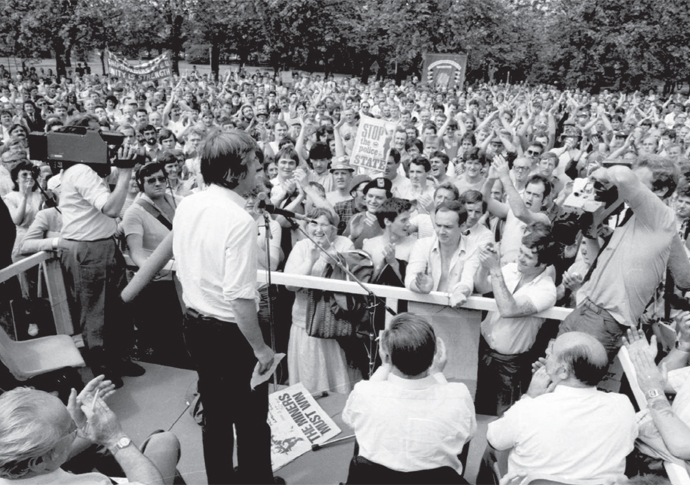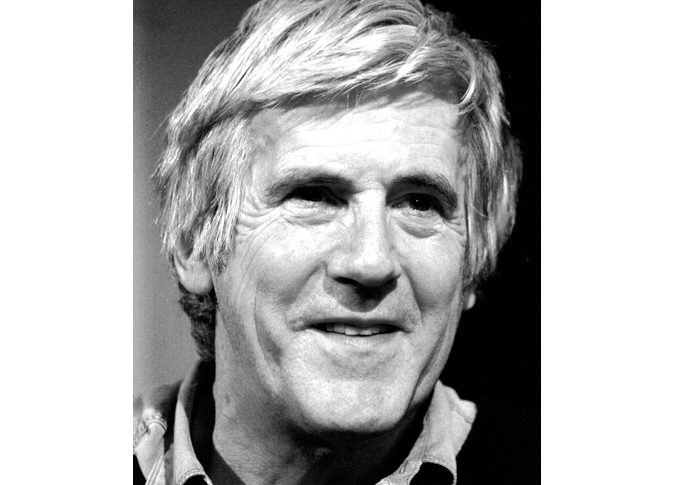Foot notes
After devouring Margaret Renn’s biography of Paul Foot, Jean Gray remembers him as a man of great humour and kindness
Thursday, 25th July 2024 — By Jean Gray

Paul Foot addressing a vast crowd in Newcastle-upon-Tyne during the 1984 miners’ strike [RIK Walton]
READING Margaret Renn’s biography of the journalist and political activist Paul Foot brought back many memories of the time I spent working with Paul at Socialist Worker during the 1970s.
The strongest image that came to mind was a packed Royal Albert Hall in 1976, filled with Right To Work marchers and supporters who had arrived in London from Manchester to a tumultuous welcome in the heart of well-off Knightsbridge.
Few can hold an audience single-handed in that vast venue, but Paul Foot had the place spellbound; repeatedly, an attentive silence in the hall as he built his case was followed by uproar at the end of each searing one-liner, jabbed at the heart of a Labour government who at that point was presiding over three million unemployed, the highest since the Second World War.
It hit me during this mesmerising performance that Paul could so easily have followed some of his contemporaries into the world of satirical comedy, finding fame and celebrity while using the mainstream media to deliver their left-wing messages with wit and humour, all very admirable and worthwhile. But that was not enough for Paul – he wanted more.
As well as explaining the world’s terrible inequalities and injustices, the point for Paul Foot was to change it. And so he became a passionate, loyal, and arguably the highest profile, revolutionary socialist in the country, a lifelong member of the organisation that segued from the International Socialists to become the Socialist Workers Party we know today.

It is a tribute to his socialist principles that as Paul castigated the government on unemployment at the Royal Albert Hall, his much-loved uncle Michael Foot was the Labour government’s employment secretary. It didn’t stop Paul from taking a swipe at the elder Foot – with no obvious damage to their personal relationship.
One of Paul Foot’s greatest assets was his ability to get on with people from across the spectrum. His privileged background was no barrier, and neither was political affiliation, as Margaret Renn documents.
Describing a long interview with the right-wing MP Enoch Powell, Paul is reported to have groaned to his Private Eye colleagues: “I liked him.”
Renn concludes: “It was a character trait – perhaps a flaw. “
According to Private Eye’s Richard Ingrams, she reports, “Paul was always wary of meeting people he was writing about, because he did have this regrettable habit of liking people.”
Acquaintances of Paul’s trying to get hold of him by calling our editorial offices at Socialist Worker could be trade unionists from a current industrial dispute looking for much-needed support, or equally they might be a member of the glitterati (sometimes surprised that I wasn’t his secretary! It was, after all, the 1970s.)
Paul’s interest in people was genuine and always kind. As a young woman who had left a working-class secondary modern school at 16 with only GCE O-levels, it could be overwhelming and confusing at times to be working alongside probably some of the most talented political thinkers of the day – they knew their Marxist and Leninist theory back to front, that’s for sure. But Paul never talked down to people, including me, and that was a skill that helped to make him arguably the best investigative journalist that Britain has ever seen, whether that is during his time with Private Eye, on documentaries, Socialist Worker or later the Daily Mirror. He advised me “never go to the top people for stories, always go to the people who are actually doing the work – they are the ones who really know what’s going on”.
When I told journalist friends that I was going to work at Socialist Worker, there was an understandable concern that life would become dour and intense. Nothing could be further from the truth. Sharing an office with Paul Foot, and others, was for me like being in an episode of today’s Have I Got News For You, particularly when Paul was at his desk, mimicry in full flow. His incredibly funny impersonations could be cruel, but to be fair he chose his targets well – mainly bureaucrats who spoke in unintelligible acronyms and jargon, and sectarians on the left whose view of the world mirrored that of Private Eye’s Dave Spart. Both offended his belief in simple, honest communication.
Paul saw humour as an important tool in persuading people of the absurdities of a capitalist system. His book Why You Should Be a Socialist is a great read and is littered with cartoons by the incredibly talented late Phil Evans.
In providing such a detailed chronicle of Paul Foot’s life, Margaret Renn also offers a history of the most important events in post war British politics up until Paul’s death in 2004. And of course, there are the celebrated cases of injustice that he campaigned so hard for.
I was reading this biography just when the Post Office scandal was unfolding as an ITV fictionalised series. I can’t help thinking of what has been lost in terms of Paul’s tenacious campaigning journalism. Until the ITV drama, hardly anyone had really connected with the tragic human consequences of these terrible Post Office events. Paul Foot knew that, above all, humanity and the pursuit of profit are mutually exclusive.
We need more like him.
• Paul Foot: A Life in Politics. By Margaret Renn, Verso, £24
• Jean Gray was a Camden Journal reporter, one of the Save the Journal strikers 1980-82, and a former editor-in-chief of RCN Publishing